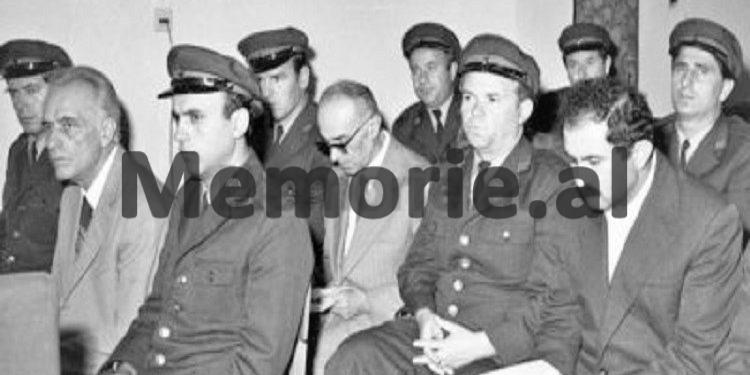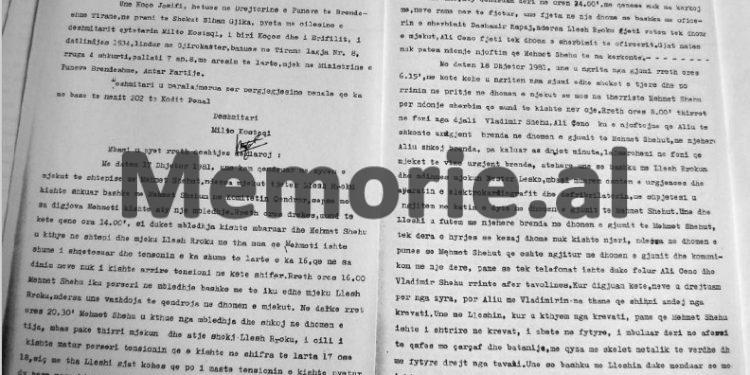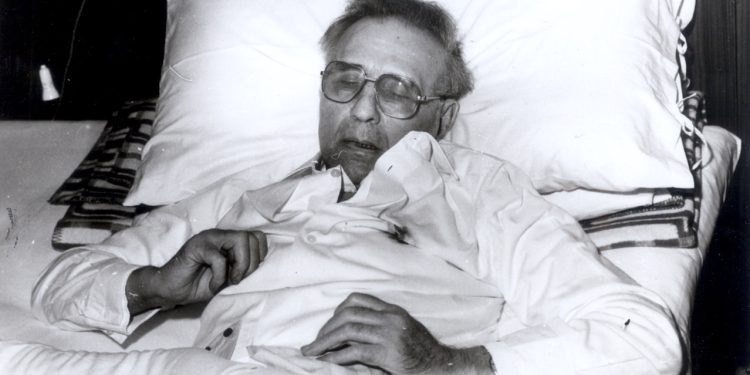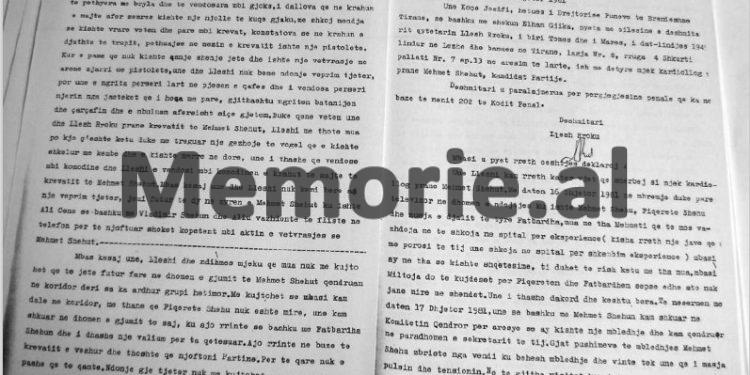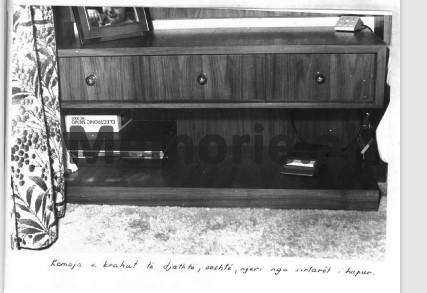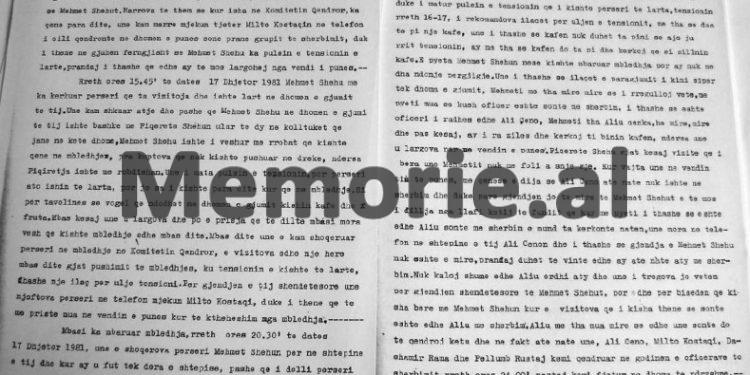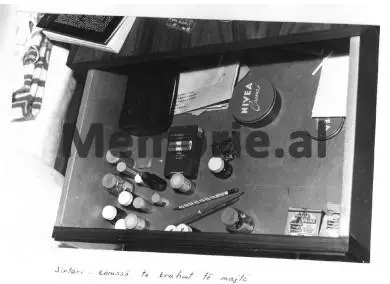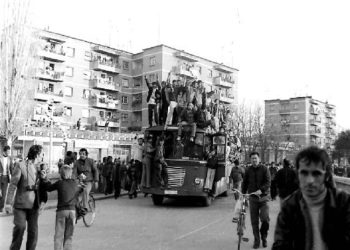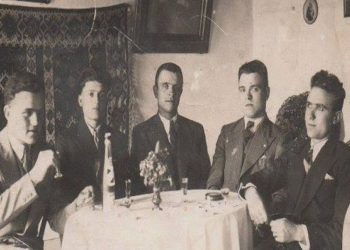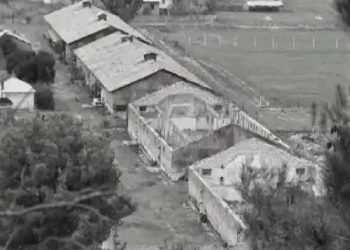From Dashnor Kaloçi
Part Six
Memorie.al / Forty-three years ago, at the dawn of December 18, 1981, the Albanian Prime Minister Mehmet Shehu, who had held that position since 1953, was found dead in his bedroom (according to the official version, from a pistol bullet) in the villa where he lived with his family, at the entrance of the “Block” of the high leadership of the PPSH, just a few meters from the building of the Central Committee of the PPSH, and also from Enver Hoxha’s villa. Although more than four decades have passed since that day, considered one of the most serious and publicized events of that regime, even today, there is still no clear and accurate version regarding what happened to the former Albanian Prime Minister, Mehmet Shehu, in the night leading to December 18, 1981! However, even after the ’90s, dozens of testimonies and archival documents have been made public regarding that event, “the murder or suicide of Mehmet Shehu,” which continues to be a subject of numerous debates and discussions, shrouding the truth about it in even more mystery!
Given this fact, in the framework of publishing dozens of testimonies and archival documents from the secret fund of the former State Security and the Ministry of Internal Affairs, or even the Central Committee of the PPSH, which we have published in these three decades after the collapse of the communist regime of Enver Hoxha and his successor, Ramiz Alia, Memorie.al has obtained the voluminous file of “the enemy Mehmet Shehu,” which was extracted from the secret fund of the former State Security (under the Ministry of Internal Affairs), where, with a few exceptions, most of them have never seen the light of publication and are published for the first time.
In the mentioned file, full and with relevant facsimiles, is the act-expertise of the operational-investigative group, which was established immediately on the morning of December 18, 1981, led by Koço Josifi (head of the Investigation of the Directorate of Internal Affairs of Tirana), the legal doctors Dr. Fatos Hartito and Docent Bashkim Çuberi, the Prime Minister’s doctors, Milto Kostaqi and Llesh Rroku, as well as the criminal expert from the Central Criminalistics Laboratory of the Ministry of Internal Affairs, Estref Myftari, assisted by senior officials of that ministry, Xhule Çiraku, Elham Gjika, and Lahedin Bardhi.
Additionally, in the voluminous file that we are making public, are the testimonies of the family members of former Prime Minister Mehmet Shehu, service personnel, and his escort group, as well as all other persons who were summoned and testified regarding that event. For more about this, the mentioned documents will inform you, which we are publishing along with the relevant facsimiles and photos.
CONTINUED FROM THE LAST ISSUE
ARCHIVAL DOCUMENT WITH THE MINUTES OF QUESTIONING OF MILTO KOSTAQI, DOCTOR OF MEHMET SHEHU, BY THE HEAD OF THE TIRANA INVESTIGATION, KOÇO JOSIFI
MINUTES
(Testimony)
Tirana, December 29, 1981
I, Koço Josifi, an investigator at the Directorate of Internal Affairs Tirana, in the presence of comrade Elham Gjika, questioned the witness citizen Milto Kostaqi, son of Koço and Erifilija, born in 1934, born in Gjirokastër, residing in Tirana, Neighborhood No. 8, “4 Shkurti” Street, Building 7, Apartment 8, with higher education, a doctor in the Ministry of Internal Affairs, a Party member.
The witness was warned about the criminal responsibility he bears under Article 202 of the Penal Code.
Witness Milto Kostaqi:
“Regarding the matter, I can say the following: I worked as a doctor for the enemy, Mehmet Shehu. On December 17, 1981, I remained in the doctor’s room, near the home of the enemy Mehmet Shehu, while at the Central Committee, he was accompanied by another doctor, Llesh Rroku. On that day, Mehmet Shehu was at a meeting at the Central Committee, from which he returned around 2:00 PM.
Doctor Llesh Rroku, while at the Central Committee and while the meeting had not yet finished, called me on the phone and told me that Mehmet Shehu had very high blood pressure, 16-17, as he had never reached this level before. Around 4:00 PM, Mehmet Shehu went back to the meeting, and along with him, Llesh Rroku went back, while I remained in the doctor’s room near his house.
In the evening, around 8:30 PM, Mehmet Shehu returned from the meeting and shortly after called doctor Llesh Rroku, who measured his blood pressure again, which remained high. As Llesh told me, he asked Mehmet Shehu twice if the meeting was over, but Mehmet did not respond; he requested coffee, while Llesh told him not to drink coffee since he had high blood pressure. However, Mehmet Shehu did not listen and drank coffee.
Llesh also gave him some medication to lower the blood pressure. After that, seeing Mehmet Shehu’s health condition, I did not go home. We stayed until 12:00 AM and then went to sleep; I slept in a room together with the service officer, Dashamir Rrapaj, Llesh slept alone in the doctor’s room, while Ali Çeno slept in the officer’s service room.
On December 18, 1981, I woke up around 6:00 AM. At that time, the other comrades woke up too and were waiting in the doctor’s room in case Mehmet Shehu called us for any service that he might need. Around 8:00 AM, Vladimir Shehu called on the intercom, who, as far as I remember, asked for Jonuz Luta, and shortly after, he notified that Ali Çeno should go urgently to Mehmet Shehu’s bedroom.
Not even ten minutes passed when we were informed via intercom that doctors should come urgently inside. Then I, along with Llesh Rroku and the assistant doctor, Nestor Lesko, after grabbing the emergency bag and the electrocardiograph and defibrillator, quickly went up to the second floor, to Mehmet Shehu’s bedroom.
I and Llesh went immediately into Mehmet Shehu’s bedroom. At the entrance door of this room, there was no one, while in Mehmet Shehu’s bedroom and office, which is adjacent to his bedroom, I saw that Ali Çeno, Vladimir Shehu, and Jonuz Luto were by the phones.
We headed towards the office, but they told us to look at the bed. Llesh and I turned back to the bed. We saw that Mehmet Shehu was lying in bed, pale, covered up to his neck with a sheet and blanket, wearing yellow metal-framed glasses, facing the ceiling.
Thinking that he might have fainted, I put my hand on his forehead and saw that he was cold. I removed one of the pillows from under his head, thinking there might be a drop in blood pressure. I took away the blanket along with the sheet and grasped his hand to check his pulse. The pulse was not working.
His hands were gathered, stiff under the blanket, positioned on his chest and bent at the elbows. I noticed a red bloodstain on the left side of his chest. It immediately occurred to me that he had committed suicide. I saw a pistol on the bed.
When we saw that it was a gunshot suicide, Llesh and I did not take any further action but arranged everything I had moved, just as I found it. At that moment, Llesh Rroku found a shell on the floor near the bed, which he picked up and placed on the left nightstand of Mehmet Shehu’s bed.
After this, Llesh Rroku, Nestor Lesko, and I left Mehmet Shehu’s bedroom and stayed in the second-floor corridor. Meanwhile, Vladimir, Ali, and Jonuz were still in Mehmet Shehu’s office making phone calls. After I went out into the corridor, they told me that Fiqrete Shehu was not well. I went to her bedroom, where she was with Fatbardha, and I gave her a Valium to calm her down.
Later, Kadri Hazbiu arrived there, who, accompanied by Ali Çeno, entered Mehmet Shehu’s bedroom. He stayed there a little while and then went to Fiqrete’s room. I heard Kadri say to Fiqrete, “Mehmeti was criticized at the Politburo meeting, but he shouldn’t have done this!” Kadri Hazbiu was given a letter that Mehmet Shehu had left before he committed suicide. After Kadri Hazbiu left, Mehmet Shehu’s bedroom was closed, but I do not know who took this action. I cannot accurately recall how much time passed before the investigative group arrived, but I entered the bedroom of Mehmet Shehu with them. Ali Çeno was also present as a witness.
Together with the members of the investigative group, everything that was in Mehmet Shehu’s bedroom was documented, but his personal clothes and wardrobe were not examined, nor was his office checked. During the time when the crime scene examination was taking place, Elham Gjika did not remain in the bedroom the entire time but left at some point.
I do not know where Elham went, how long he stayed, or what actions he performed, as I was focused on the activities of examining the crime scene in Mehmet Shehu’s bedroom. After the examination of the bedroom was completed, we exited into the corridor of the second floor, and at that time, the sealing and waxing of the doors of Mehmet Shehu’s room began, which lasted about a quarter of an hour.
After the examination of the bedroom was completed, I remember that Bashkim Çuberi, Fatos Harito, and I exited into the second-floor corridor. In the corridor, I do not recall Elham Gjika, Koço Josifi, Ali Çeno, and Estref Myftari leaving with us. As far as I remember, they went out together after the doors had been sealed.
When these actions were completed, we went down to the first floor of the building, where witnesses were questioned, including myself, Ali Çeno, Fiqrete Shehu, Llesh Rroku, and I believe Vladimir Shehu as well. I do not know if any person was questioned in writing as a witness on the second floor. When the witnesses were questioned, the three investigators were present: Elham Gjika, Koço Josifi, and Dhimitër Beshiri.
A few days later, I was called to the Ministry of Internal Affairs, and in Elham Gjika’s office, I signed my questioning minutes, which were typed. I did not notice anyone entering Mehmet Shehu’s office during the crime scene examination, as I was focused, along with doctors Bashkim Çuberi and Fatos Harito, on examining Mehmet Shehu’s corpse.
ARCHIVAL DOCUMENT WITH THE MINUTES OF QUESTIONING OF MIMOZA TRESA, EMPLOYEE IN MEHMET SHEHU’S HOUSE, BY THE HEAD OF THE TIRANA INVESTIGATION, KOÇO JOSIFI
MINUTES
(TESTIMONY)
IN TIRANA, DECEMBER 28, 1981
I, Koço Josifi, head of the Investigation Department at the Directorate of Internal Affairs Tirana, in the presence of comrade Elham Gjika, questioned the witness citizen Mimoza Tresa, daughter of Hamidi and Xhevrie, born in 1963, born and residing in Tirana, Neighborhood No. 5, “Konferenca e Pezës” Street, Building No. 13/2, with an eighth-grade education, employed at the Guest Directorate.
The witness was notified of the criminal responsibility she bears under Article 202 of the Penal Code.
Witness:
Mimoza Tresa
After being questioned regarding the matter, she stated:
I have been working as a worker in Mehmet Shehu’s house since July 1981. On December 17, 1981, around 1:00 PM, I started work, and Farie Lila was also on duty with me. Throughout the day, I did not see Mehmet Shehu, but I continued to work down in the kitchen. Around 9:45 PM, my colleague, Farije Lila, left for home, leaving me alone. Farija also took dinner that night to Mehmet and Fiqrete Shehu.
Around 10:10 PM, Mehmet Shehu rang the bell, and I went to his office on the first floor, where he was with Fiqrete. When I got there, he instructed me to make a coffee for himself. I made the coffee and brought it up to him, along with a glass of water, to his office on the first floor, where both Mehmet and Fiqrete were sitting at a table in the office. After I left the coffee, I returned to the kitchen.
Around 11:00 PM, I went to see if Mehmet and Fiqrete were still in the office on the first floor, where I had taken the coffee. When I went there, the office door was open, the light was off, and I realized they had left the office. I didn’t see where they went, but thinking they had gone upstairs to the second floor, where the bedrooms are, I took the cup and the glass of water and went to the kitchen.
Around 11:15 PM, I went to the bedroom, which is on the first floor, from the old part of the building, and around 11:30 PM, I went to sleep. I was alone in the room; the room where I slept is adjacent to the nurses’ room, which that night was occupied by Valentina Gina. Throughout the night, I slept normally and did not hear any noise; no one woke me during the night, and I woke up at 5:00 AM on December 18, 1981
After I got up, I went to the kitchen and prepared food for Mehmet Shehu’s sons, Vladimir Shehu and Bashkim Shehu, who came, had their meal, and left. At 7:30 AM on December 18, 1981, I left work to go home; the work continued with the other shift workers, Farija and the others.
I learned about Mehmet Shehu’s suicide at 8:00 PM on December 18, 1981, when it was broadcast on television. I was at my house, because at 12:30 PM on that date, I went to work, but the service officer did not allow me to enter and told me to return home, as the responsible person had given the order for a break. So I returned to my home.
After reading the minutes, I saw that my statements were written correctly; I do not know anything else regarding this matter. Memorie.al
Witness
Mimoza Tresa
Continues in the next issue




